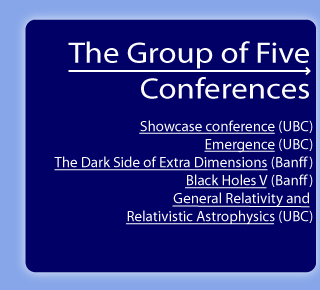Archived videos and slides of:
presentations
panel discussions
public lectures

We thank our generous sponsors:

|
|
See also the public lectures and the main
presentations.
1rst Panel Discussion:
The Theory of Everything?
The two great revolutionary discoveries of the 20th century, quantum
mechanics and general relativity, have been very hard to
reconcile--to do so has been a dream of many physicists, searching
for the 'Theory of Everything'. Present efforts centre on string
theory, and attempts to derive a theory of 'quantum gravity',
although other approaches exist as well. The only laboratory which
can test these ideas appears to be astrophysical, probing almost
back to the Big Bang. This panel looked critically at where we
are now in these efforts, and asked whether the current approach
really is the right one, and there really is a 'Theory of
Everything', or whether Nature is instead just 'wheels within wheels...'
ad infinitum.
VIDEO
INTERLOCUTOR: Prof Steve Shenker (Stanford)
PANEL MEMBERS: Prof Paul Davies (Sydney)
Prof Gerard 't Hooft (Royal Dutch Academy)
Prof Lisa Randall (Harvard)
Prof Bill Unruh (UBC)
Prof Robert Wald (Chicago)
2nd Panel Discussion:
Quantum Mechanics: Dreams and
Reality
The most powerful scientific theory in history, quantum
mechanics, has done more to change our world than any other
human discovery--and yet it is fundamentally mysterious to
us. Apart from its connection to the deepest issues on
cosmology, quantum mechanics will play a pivotal role in the
21st century, in the development of exotic new technologies,
and in the coming nanoscience revolution. The panel
looked at how quantum mechanics will affect our lives in the
coming decades.
VIDEO
INTERLOCUTOR: Prof George Sawatzky (UBC and AMPEL)
PANEL MEMBERS: Prof Gabe Aeppli (London Centre for
Nanotechnology)
Prof Bob Clark (Sydney)
Prof Gerard Milburn (Queensland)
Prof Hari Manoharan (Stanford)
Prof Hirosi Ooguri (Caltech)
3rd Panel Discussion:
What are the Fundamental Questions
of Physics?
There are passionate discussions amongst scientists about
what the really big questions are and how to answer them. A
great deal turns on the answers--not just the evolution of
physics (and much of the rest of science) but also human future
technologies, and the world we live in. In fact deep
philosophical issues separate physicists here--'reductionists'
feel that the fundamental problems are in
the realm of microscopic physics (strings, etc.) and
quantum gravity, whereas as 'emergers' argue that questions
about complex systems (including living ones) are just as
fundamental, and unanswerable in principle using microscopic
physics. VIDEO
INTERLOCUTOR: Prof PCE Stamp (UBC and PITP)
PANEL MEMBERS: Prof Phil Anderson (Princeton)
Prof Kathryn Moler (Stanford)
Prof Mannque Rho (Saclay)
Prof John Schwarz (Caltech)
Prof Lenny Susskind (Stanford)
|


